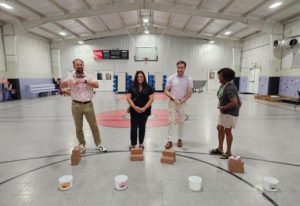Students under pressure in two books
Published 12:15 am Sunday, November 6, 2022

- finalist
“The Finalists,” by David Bell. New York: Berkley, 2022. 383 pages, $27 (hardcover), $17 (paperback).
“Spit and Polish: A Kentucky Boy’s Coming of Age in a Tennessee Military School,” by Judge (Ret.) William Robey Harris Jr., Louisville: Butler Books, 2022. 104 pages, $24.95 (hardback).
Trending
The two books under review seem to have little in common, with one being a mystery and the other a memoir, but they do share this: students in an academic setting put under pressure.
David Bell is a professor of English at Western Kentucky University who teaches creative writing and composition. He has published 11 other books, including “Cemetery Girl” and “Kill All Your Darlings.”
In this mystery, the finalists are six college students competing for the prestigious Hyde Scholarship, which is based on both academic excellence and financial need. Hyde College is a small, private institution in Bluefield, Ky., founded by Ezekiel Hyde, its first president, who had been a major in the Union Army during the Civil War. Nicholas Hyde is the only direct descendant of Major Hyde surviving to administer the black book of bylaws to oversee the scholarship process.
The six students must surrender their electronic devices and be locked in Hyde House, the Major’s home on campus, for eight hours. They will have a written exam, have lunch and have an oral exam. Any student who leaves before the time is up will be disqualified.
Some other issues also confront the six students. When they arrive, they see about 30 of their fellow students protesting the Hyde family’s connection with the college. They hold up signs protesting blood money, paying for education with coal, killing Mother Earth and slaughtering the innocents.
Vice President Troy represents the college in the scholarship competition and the college president explains to him over the phone that the innocents referred to were 10 Confederate soldiers who were killed in the Palmyra Massacre by Major Hyde’s men instead of taking them prisoner. There is a lot of noise and shouting and a brick is thrown, but campus police soon control the protests. The chief development officer for the college knows that both his future and the college’s depend on Hyde’s continuation and even significant expansion of his donations to the college so student protests are not a good sign for the future.
Trending
Bell does a good job of having the students interact with one another and with Nicholas Hyde and Troy. All six are of course competitive, and the hardest thing for readers to accept is that when one of the students drops dead mysteriously, the process continues and no one gets police or medical help involved. The students begin to fear poisoning and start to question one another’s comments and movements around the spooky Hyde House.
I enjoy reading academic mysteries and Bell is adept at maintaining tension throughout this challenging experience. Readers completing one chapter will generally want to move on to the next one. There are enough red herrings to suspect any of the students and even Hyde of being the murderer. I recommend this fine mystery very highly. I correctly guessed the identity of the murderer. See if you can also!
Judge (Ret.) William Robey Harris Jr. was born and raised in Franklin, Ky., and he attended public schools there through the eighth grade. At age 14 in the fall of 1957, his parents enrolled him at the Castle Heights Military Academy in Lebanon, Tenn., with the hope that “their lackadaisical, happy-go-lucky son” would mature there and become more serious about his studies. Sixty-five years later, Harris has published “Spit and Polish” as a memoir of his experiences growing up at this particular military academy. The boy was not consulted about this decision, but only brought in from mowing the lawn to be told of his fate and then returned to his chores.
Harris reflects: “Did my Heights experience make me a better man, Christian, husband, father, citizen, lawyer or judge than I would otherwise have been? I don’t know for sure, but I suspect that it did.”
He acknowledges that many friends got excellent educations in the local school system and had successful careers, but his experience at the Heights didn’t kill him. “Not quite.” Harris admits that by the end of the first week at the Academy, he was so homesick he thought he was going to die: “I even missed my sister and brother.”
Harris provides a thumbnail sketch of the school’s history, starting with its beginning as Castle Heights School, a co-educational prep school, in 1902. In 1917, in connection with America’s involvement in World War I, it became an all-male military institution. After being designated as an Honor School by the Department of Defense, the Academy had to undergo an annual general inspection by the inspector general of the Third Army. One can imagine the intense preparations that would be required of cadets to prepare for these inspections. Harris notes the high academic quality of the education provided by the Academy and says that most of its graduates were admitted to the college or university of their choice.
The life of a cadet was regimented. Anyone who has experienced basic military training can understand this, but readers must remember that most of these students were high schoolers. The author provides details on the daily routine of a cadet as well as on his personal experiences as a cadet. He acknowledges that homesickness and loneliness were particularly overwhelming in his first year as a cadet. When cadets went to the two formal dances each year, they had to have a date and the school’s social director had to approve the date so she could screen out any “fast” girls.
When Bill failed to line up a date for his first dance of his first year, the social director assigned one who bore a resemblance to “a cat named Frankenstein.” In the spring, he had the good sense to line up a date with a hometown girl. In his Reflections chapter, Bill admits that his experiences at Heights “have been positive forces throughout my adult life.” He also makes this interesting observation: “I am humbled to number myself among those millions of white Southerners of goodwill who came to realize that the Jim Crow South into which we had been born and nurtured was morally and legally indefensible. It was our obligation to begin correcting the injustices that generations before us had perpetuated. The task remains unfinished, but thank God progress is ongoing.”
“Spit and Polish” is an interesting memoir of student life in a military academy in the late 1950s and early 1960s. The section of photographs is helpful for readers to connect faces with names and see the campus, but two of the images are too dark to fully appreciate. The book is well written, and anyone interested in the time period should find it interesting and informative.
– Reviewed by Richard Weigel, WKU History Department.
Editor’s Note: There will be an “Author’s Discussion” for William Harris’ book on Thursday, Nov. 10 from 5:30 to 6:30 p.m. at the Gallery on the Square at 110 N. Main St. in Franklin.







